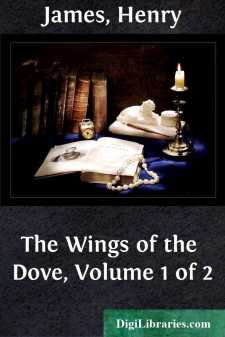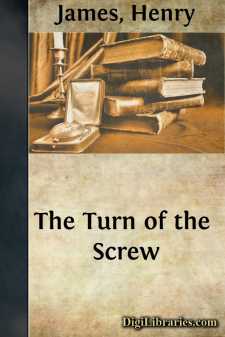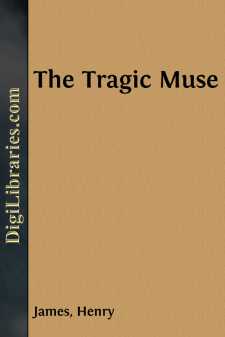Categories
- Antiques & Collectibles 13
- Architecture 36
- Art 48
- Bibles 22
- Biography & Autobiography 813
- Body, Mind & Spirit 142
- Business & Economics 28
- Children's Books 13
- Children's Fiction 10
- Computers 4
- Cooking 94
- Crafts & Hobbies 4
- Drama 346
- Education 46
- Family & Relationships 57
- Fiction 11828
- Games 19
- Gardening 17
- Health & Fitness 34
- History 1377
- House & Home 1
- Humor 147
- Juvenile Fiction 1873
- Juvenile Nonfiction 202
- Language Arts & Disciplines 88
- Law 16
- Literary Collections 686
- Literary Criticism 179
- Mathematics 13
- Medical 41
- Music 40
- Nature 179
- Non-Classifiable 1768
- Performing Arts 7
- Periodicals 1453
- Philosophy 64
- Photography 2
- Poetry 896
- Political Science 203
- Psychology 42
- Reference 154
- Religion 513
- Science 126
- Self-Help 84
- Social Science 81
- Sports & Recreation 34
- Study Aids 3
- Technology & Engineering 59
- Transportation 23
- Travel 463
- True Crime 29
Henry James
Henry James (1843-1916) was an American author known for his contributions to 19th-century literary realism and modernism. His works often explore themes of consciousness and perception, with notable novels including "The Portrait of a Lady," "The Turn of the Screw," and "The Wings of the Dove." James is celebrated for his intricate prose style and deep psychological insight into his characters.
Author's Books:
Sort by:
by:
Henry James
The litigation seemed interminable and had in fact been complicated; but by the decision on the appeal the judgement of the divorce-court was confirmed as to the assignment of the child. The father, who, though bespattered from head to foot, had made good his case, was, in pursuance of this triumph, appointed to keep her: it was not so much that the mother's character had been more absolutely...
more...
by:
Henry James
"I say, you know, Kate—you did stay!" had been Merton Densher's punctual remark on their adventure after they had, as it were, got out of it; an observation which she not less promptly, on her side, let him see that she forgave in him only because he was a man. She had to recognise, with whatever disappointment, that it was doubtless the most helpful he could make in this character. The...
more...
by:
Henry James
THE WINGS OF THE DOVE She waited, Kate Croy, for her father to come in, but he kept her unconscionably, and there were moments at which she showed herself, in the glass over the mantel, a face positively pale with the irritation that had brought her to the point of going away without sight of him. It was at this point, however, that she remained; changing her place, moving from the shabby sofa to the...
more...
by:
Henry James
THE TURN OF THE SCREW The story had held us, round the fire, sufficiently breathless, but except the obvious remark that it was gruesome, as, on Christmas Eve in an old house, a strange tale should essentially be, I remember no comment uttered till somebody happened to say that it was the only case he had met in which such a visitation had fallen on a child. The case, I may mention, was that of an...
more...
by:
Henry James
I profess a certain vagueness of remembrance in respect to the origin and growth of The Tragic Muse, which appeared in the Atlantic Monthly again, beginning January 1889 and running on, inordinately, several months beyond its proper twelve. If it be ever of interest and profit to put one's finger on the productive germ of a work of art, and if in fact a lucid account of any such work involves that...
more...
by:
Henry James
Mrs. Gereth had said she would go with the rest to church, but suddenly it seemed to her that she should not be able to wait even till church-time for relief: breakfast, at Waterbath, was a punctual meal, and she had still nearly an hour on her hands. Knowing the church to be near, she prepared in her room for the little rural walk, and on her way down again, passing through corridors and observing...
more...
by:
Henry James
IT was an occasion, I felt—the prospect of a large party—to look out at the station for others, possible friends and even possible enemies, who might be going. Such premonitions, it was true, bred fears when they failed to breed hopes, though it was to be added that there were sometimes, in the case, rather happy ambiguities. One was glowered at, in the compartment, by people who on the morrow,...
more...
by:
Henry James
I "I guess my daughter's in here," the old man said leading the way into the little salon de lecture. He was not of the most advanced age, but that is the way George Flack considered him, and indeed he looked older than he was. George Flack had found him sitting in the court of the hotel—he sat a great deal in the court of the hotel—and had gone up to him with characteristic directness...
more...
by:
Henry James
CHAPTER I The poor young man hesitated and procrastinated: it cost him such an effort to broach the subject of terms, to speak of money to a person who spoke only of feelings and, as it were, of the aristocracy. Yet he was unwilling to take leave, treating his engagement as settled, without some more conventional glance in that direction than he could find an opening for in the manner of the large...
more...
by:
Henry James
On the morrow, in the evening, Lord Warburton went again to see his friends at their hotel, and at this establishment he learned that they had gone to the opera. He drove to the opera with the idea of paying them a visit in their box after the easy Italian fashion; and when he had obtained his admittance—it was one of the secondary theatres—looked about the large, bare, ill-lighted house. An act...
more...











